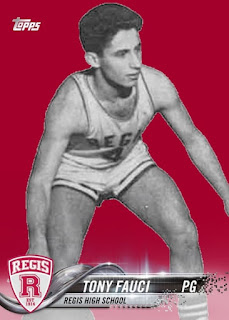Devil’s Advocate: Farewell to Fauci
Jim Kavanagh
Noble Heart
I watched the
emergence of Anthony Fauci into international prominence over the past two
years with particular interest. He and I are graduates of the same New York
City high school, a commonality that gives me some insight into his
intellectual formation. Though it was some years after him, I played on the
basketball team, too. Somewhere, there’s a picture of me in those cool shorts, that
I promise you will never see.
Regis High School is a unique institution. It is a highly selective, academically rigorous, all-boys Jesuit high school on the Upper East Side of Manhattan. It is widely considered the best Catholic high school (and one of the best overall) in the country. It gave Anthony Fauci (and me) a strong classical rhetoric-and-logic education in the Jesuit tradition —the Iliad and Odyssey, the Aeneid and Caesar’s Wars, in the original Greek and Latin. It’s an education that, at its best, laid the foundation for logical and critical thinking, and prepared students for the best liberal arts colleges. It also fostered Catholic and Jesuit ethical values, which, of course, have changed over the years.
The Jesuits were formed as the vanguard of the Counter-Reformation and have historically been attached to reactionary politics, but the order is also highly adaptable to the changes in social ideology, while maintaining a consistent commitment to educating the future elite. By the time I was in high school, some good men like Daniel Berrigan, were teaching smart students to see the world through lenses of intellectual and moral honesty, helping them lapse to the left. Like Fidel, who said the Jesuits who ran the high school he attended, “influenced me with their strict organization, their discipline and their values. … They influenced my sense of justice.”
Even more
unusual for an academically elite school on the Upper East Side, Regis is
tuition-free. Unique, indeed. That’s because it was endowed in 1914, by the
widow of New York City mayor Hugh Grant, to offer a free rigorous education to
the boys from the city’s poor Catholic (Irish, Italian, etc.) immigrant
families. Yup, before it was the home of the UN and Gossip Girl, the East Side
was a neighborhood of slaughterhouses and the East Side Kids.
So, into the
70s at least, Regis was a school to which middle strata (virtually all white) Catholic
families—from dockworkers and firemen to lawyers and pharmacists (Fauci’s
father)—throughout the NYC region strove to have their sons accepted. Many kids
commuted over an hour each way every day. It was understood as the ticket to a
solid professional career. And, indeed, it produced a slew of very smart
lawyers, doctors, and professors (not so much bankers) who become loyal alumni.
Here's a prototypical testimony—including the “it changed my life” part—from a
well-known alumnus:
It was definitely my ticket out of Staten Island, because it got me into a Catholic high school called Regis, which would change the course of the rest of my life. I was extremely lucky to get accepted to Regis, because (a) it’s one of the best high schools in the country and (b) it’s free. For Catholics in New York, Regis is almost like the Watchtower building for Jehovah’s Witnesses. Tens of thousands of kids apply for a hundred and twenty spots in each class. To this day, if a Catholic mother hears that I went to Regis, she will grab my face and say, “God bless! What a wonderful place!” --Colin JostThis Regis High School background might help you to understand a couple of things about how I understand the phenomenon of Anthony Fauci. First of all: Think you've seen Fauci worship in mainstream media over the past two years? Nothing compared to the Zoom meetings with my Regis classmates! Anathema is the precise word for any criticism of Anthony Fauci in that circle. When I sent them the link to my anti-mandate article last year, I got a slew of derogatory responses, including this wish to see me die in agony: "My one regret is not being present in the COVID ICU to witness the author struggling for his final agonal breath." From a medical doctor. At a Catholic hospital. Noble Hearts, as we Regians call ourselves. (“My Ours Be The Noble Heart” is the school anthem.)
But what best
explains the relevance of Regis to Anthony Fauci is an anecdote regarding my
nephew, who applied to the school some years after me. His father, my oldest
brother (who had not gotten into Regis and pooh-poohed it, though unavoidably
respecting it) wanted his son to go, but my nephew was more interested in going
to high school with his friends in Queens rather than commuting to the geeky
school in Manhattan. Having passed the exam, my nephew headed into the
obligatory personal interview with a Jesuit, who asked him a stock interview
question: "Who is the historical personage you admire most?"
Sensing the chance to shock the sensibilities of the old priest and the
old man, and to banish the prospect of four years in nerdville, my nephew
replied: "Judas Iscariot." When asked to elaborate, he pointed
out that Judas did the dirty but necessary work that nobody else would, though
it brought shame and scorn on him from all quarters, and performed the key act
without which the rest of the story would not have been able to unfold in the
gloriously celebrated way that it did, yada, yada.
My nephew was not showing off his knowledge of a recently discovered Gnostic gospel. He was just being a smart-ass. But, "smart" was the operative word. Much to his surprise—though not to those who are familiar with the intricate wiles of the mind that is known as "Jesuitical"—he was accepted. One can just hear the good fathers: "Now that is the kind of student we want at Regis."


